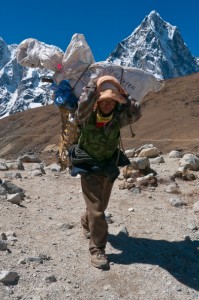 I was recently talking with a friend who had just come back from a trip to Asia—somehow, we began talking about the role of a Sherpa and the importance of having one. Sherpas are mountaineering professionals famous for guiding climbers up the most challenging peaks in the world.
I was recently talking with a friend who had just come back from a trip to Asia—somehow, we began talking about the role of a Sherpa and the importance of having one. Sherpas are mountaineering professionals famous for guiding climbers up the most challenging peaks in the world.
Bottom-line, having a Sherpa is critical to navigate a treacherous expedition or journey (think Mt. Everest). These Sherpas, or guides, are incredibly focused, resilient, and tough, yet possess a great deal of empathy. When I think of these individuals and the attributes they possess, I think of great business leaders, specifically the roles they serve to their employees as guides.
Just as a great Sherpa provides confidence and encouragement on the journey ahead; we, as leaders, should strive to do the same—every day. And just as a great Sherpa does, good leaders must do the following as well:
Lead others to be and do more. A Sherpa’s success is distinguished by their ability to help others achieve heights and limits beyond what they thought possible. The journey isn’t about the leader or one individual—it is about the team as a unit.
Thorough planning saves lives. If your Sherpa didn’t have a plan, you wouldn’t feel very confident and probably wouldn’t make it to the top. Great leaders carefully plot out each step of their attack to ensure a safe ride.
Setbacks will happen. Sherpas regularly deal with unexpected weather, predators, obscured paths, and many other obstacles. A great Sherpa makes quick adjustments to prevent any major setback. This ability to assess, react, and adapt is critical to great leadership.
Walk together as a team. The role of a Sherpa isn’t to lead from afar. These leaders climb the mountain and endure the struggles and success with the team. As a result, trust is built and success is achieved.
Listening is key. Sherpas must carefully listen to data points from all sources. They need to truly understand the relative weight of importance of all the feedback from their team and the basecamp crew. Good leaders do this by not only asking for their teams’ input and feedback along the way, but by using that input and feedback to build out growth initiatives for the organization.
Whether you are considering climbing Mt Everest or not, if you embrace the ways of the Sherpa, you may just end up reaching that rarified air sought by many, but enjoyed by few.
Frank Belen is a Principal for entreQuest. He helps to develop and grow business and C-level leadership and assists small to medium sized businesses Grow Regardless.







